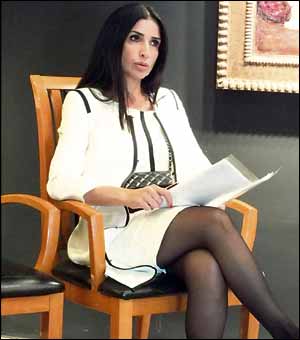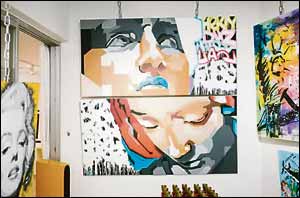 | ||
| French consul installs art gallery in Herzliya home | ||
Nathalie Mimoun, honorary French consul of Israel’s central/north region, has installed an art gallery in her Herzliya Pituach home.
Artworks stand in the garden, living room and dining room, on stairways and even in the bathrooms. The large basement floor, with its exhibition space and office, houses the gallery proper. But art lives and breathes throughout the entire house. I enjoyed a cup of coffee with Mimoun in her kitchen, viewing an installation showing two foetuses floating in glass cubes, one unborn child wearing a heavy modern wig and Onassis-style glasses, and the other a white Elvis costume. Perhaps it’s a commentary on the commercialised environment that today’s children are born into today. Beside the china cabinet with its display of the family’s silver hangs a much-larger-than-life photograph of a serious young man wearing an androgynous shirt that leaves his midriff bare. The art isn’t meant to be merely pretty. It’s meant to provoke thought and emotional reactions. “I put the art in my living room to show how artworks blend into everyday life,” Mimoun explains. “And here, art lovers and collectors can meet the artists in person in an informal, comfortable atmosphere.” It’s the Chabba Gallery (pronounced shabba), named after her great-grandmother, whose name means harmony and the desire to please in Arabic. “It fits in with what I’m doing here,” Mimoun comments. Chabba is also her second name. Mimoun studied medicine in Paris, but left her studies and family some 30 years ago when she married an Israeli diamond businessman. “It was hard at first. I wanted to continue my studies, but soon saw that the most important thing was to acclimatise. I spoke little Hebrew, so I studied at an ulpan in Netanya. “My Hebrew is still full of mistakes,” she laughs, although I was charmed by her rapid, fluent Hebrew with its crisp French accent. “I had no one here; no friends and no family other than a brother in Nahariya. “What could I do all day? Cultural life in Israel was poor 30 years ago, compared to today. So I worked with my husband in his business, eventually replacing the manager. “That was my job, for a long time.” During those years, the couple had four children and Mimoun’s focus shifted to her family. “My most important work was to bring my children up,” says Mimoun. I have always worked helping others, and donated money to good causes, but while my children were small, I had no time to be physically active in charitable work.” That came later, when the children were grown up.
“French Jews come, as I did, needing support in this new environment. “At the same time, they wish to maintain close ties with France; voting in French elections, for example. “My task is to help them with all kinds of bureaucratic issues. For example, when a couple wishes to marry here and register their marriage in France, so that their children have dual citizenship. “There are inheritance issues, such as when an immigrant dies here and the widow has pension rights in France.” Mimoun set up a voting station in Netanya for the French elections so that people in the central/northern areas wouldn’t need to travel to Tel Aviv. Eventually, she was given the title of consul in order to be able to sign and stamp documents pertaining to French/Israeli citizens. “It gives me the power to authorise procedures and to prove that I was present when someone signed a document. “I do all this on a volunteer basis, and have great pleasure in helping. The embassy and consulate always support me and supply whatever I need.” But the energetic Mimoun wasn’t satisfied with only her consular work. Looking for a way to follow her personal interests, she began exploring the idea of opening an art gallery in support of Israeli and foreign artists. “In Paris, I was surrounded by galleries and museums,” she says. “I’ve always had a passion for art. “Wherever I travel, I visit local exhibitions and make a point of speaking with the directors and artists. I thought, why not open a gallery to help artists sell their works?” Chabba is where Mimoun’s business experience, love of art and desire to promote Israeli artists combine. The formal gallery has been functioning only for the last three months, although the house has been a sort of gallery for over a year. Does living with an art gallery in the home affects the family’s privacy? “It’s not like a shop, where people go in and out freely,” explains Mimoun. “It’s a private gallery, where buyers come by appointment to meet new and established artists and view the artworks. I arrange meetings so as not to intrude on the family’s early morning time, or on our family dinners in the evening. “On Fridays, when I’m cooking for Shabbat, visitors may come only at certain hours. “The children grew up with art in the house. They find it easy to accept the gallery in the home environment. And when someone visits, they see that art belongs in the home – everywhere in it.” Mimoun doesn’t advertise the gallery. “It’s an intimate experience,” she says. “I want to keep it that way. I want visitors to feel easy, to talk, not in awed whispers, but in normal conversational tones — to move around freely, sit down, even eat — as they would at home.” The gallery attracts buyers: collectors, art appraisers, interior decorators. A buyer might be someone renovating or buying a house. They tell Mimoun what sort of art they would like to live with, and she arranges a meeting with an artist whose style she thinks will fit in with their vision. The artist will bring examples to the prospective buyer’s home, explain the art and advise where in the house to best display it. There are also those who collect art as an investment. If a collector decides that an artist’s works will increase in value, they may buy all their works. For a new gallery, it’s already successful. There have been sales and many meetings between artists and buyers. The gallery also has a library of videos, where the artists talk about themselves and their work. The exhibition changes every three months, allowing visitors to see how particular artists develop and change. The gallery also exhibits works centred around a theme. The previous exhibition centred around pop and street art. Currently, Chabba’s exhibit focuses on artists portraying other artists. Part of the proceedings go to support for the “Nacheh, lo hatzi ben adam” association for the disabled. Mimoun makes a point of meeting each artist personally and making a personal connection with them. “We sit over coffee and discuss all kinds of things. I choose from artists who are genuine, sincere,” she says. “Their works come from the heart. It gives me huge satisfaction to help them sell their works. “I don’t demand exclusivity; they’re free to exhibit in other venues at the same time as here. I believe in them.”
If you have a story or an issue you want us to cover, let us know - in complete confidence - by contacting newsdesk@jewishtelegraph.com, 0161-741 2631 or via Facebook / Twitter
|
 NATHALIE MIMOUN: ‘I put the art in my living room to show how artworks blend into everyday life’
NATHALIE MIMOUN: ‘I put the art in my living room to show how artworks blend into everyday life’